Thomas James Richards, Diaries, Transcript Vol. 2 - Part 19

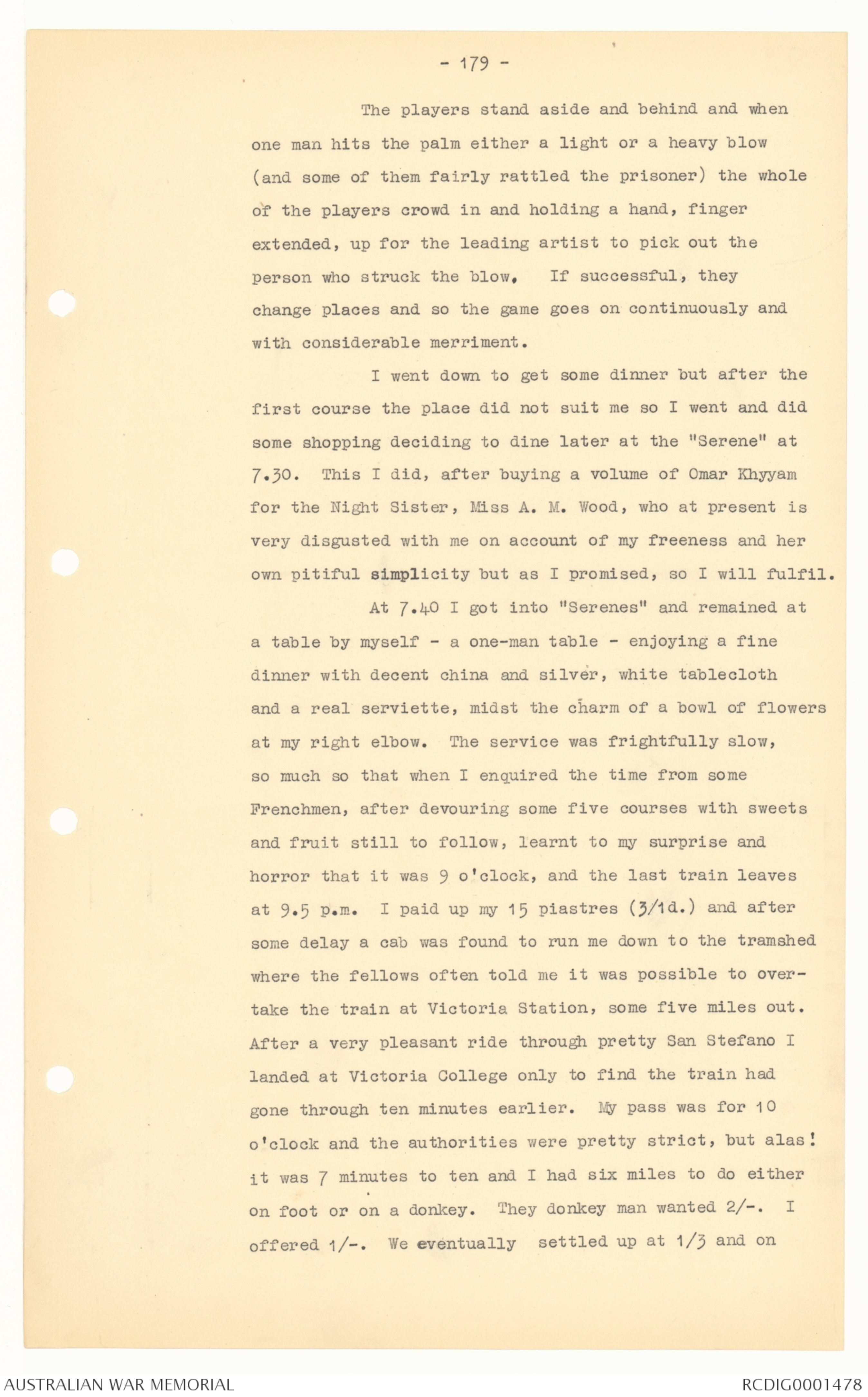
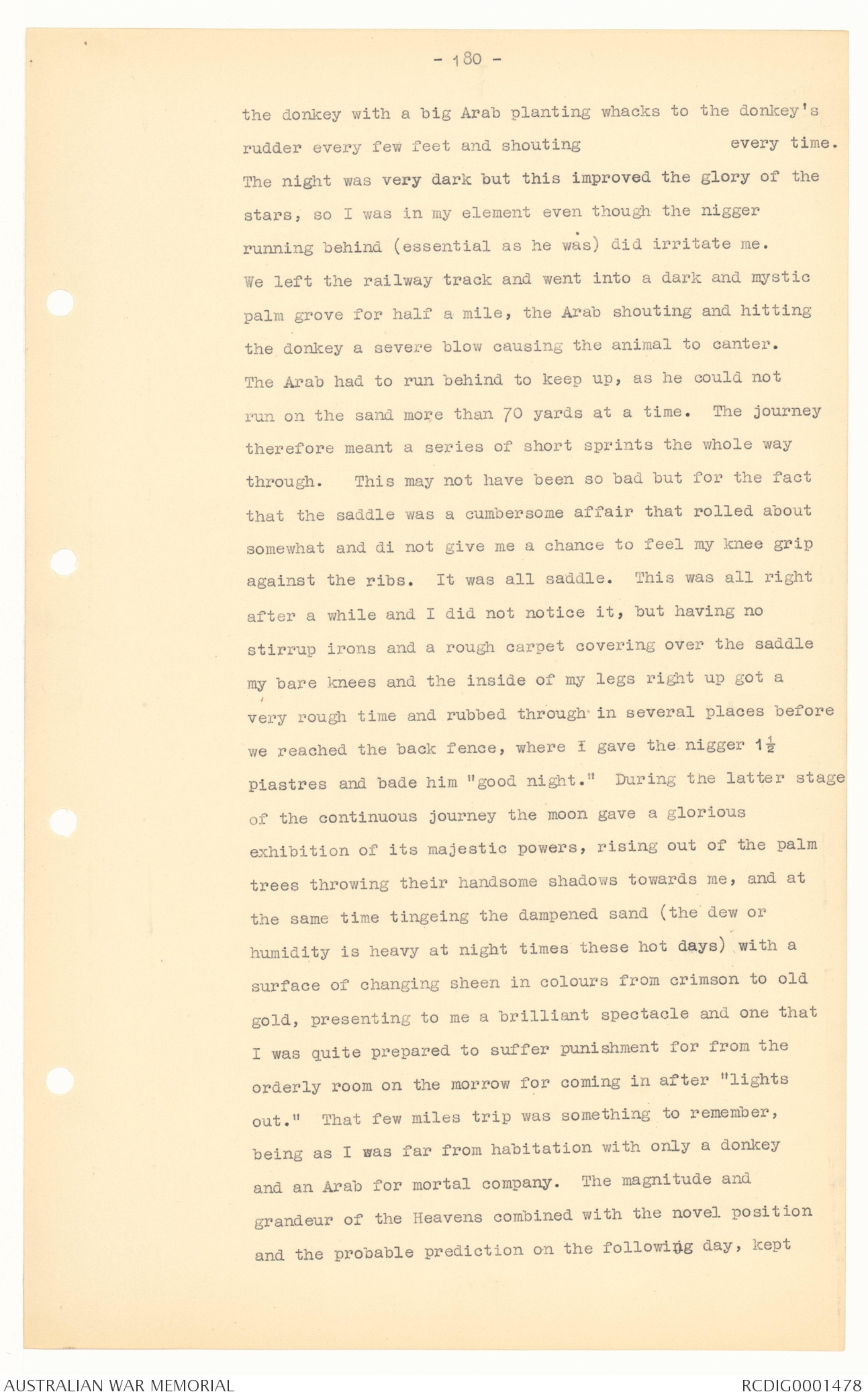
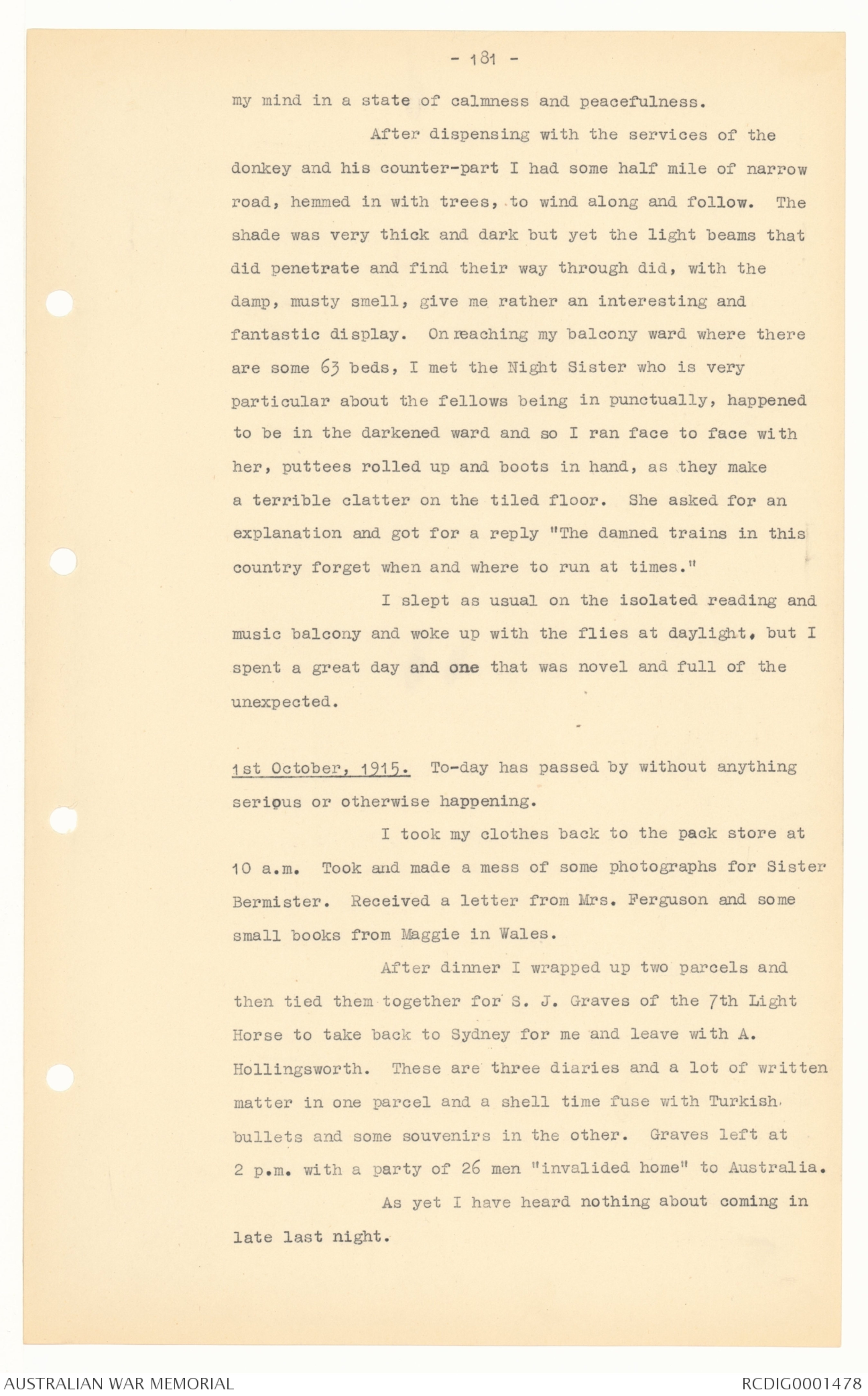
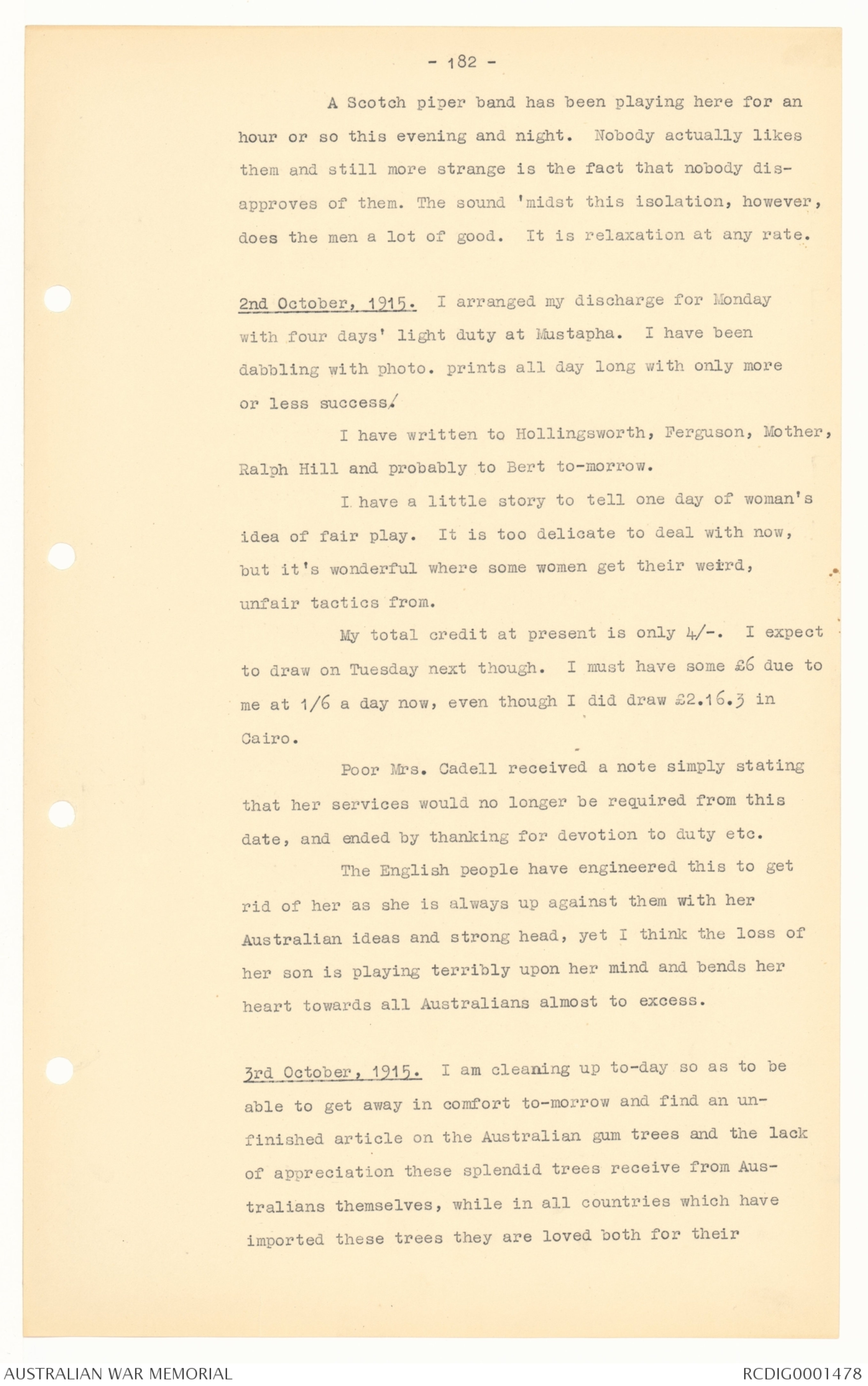
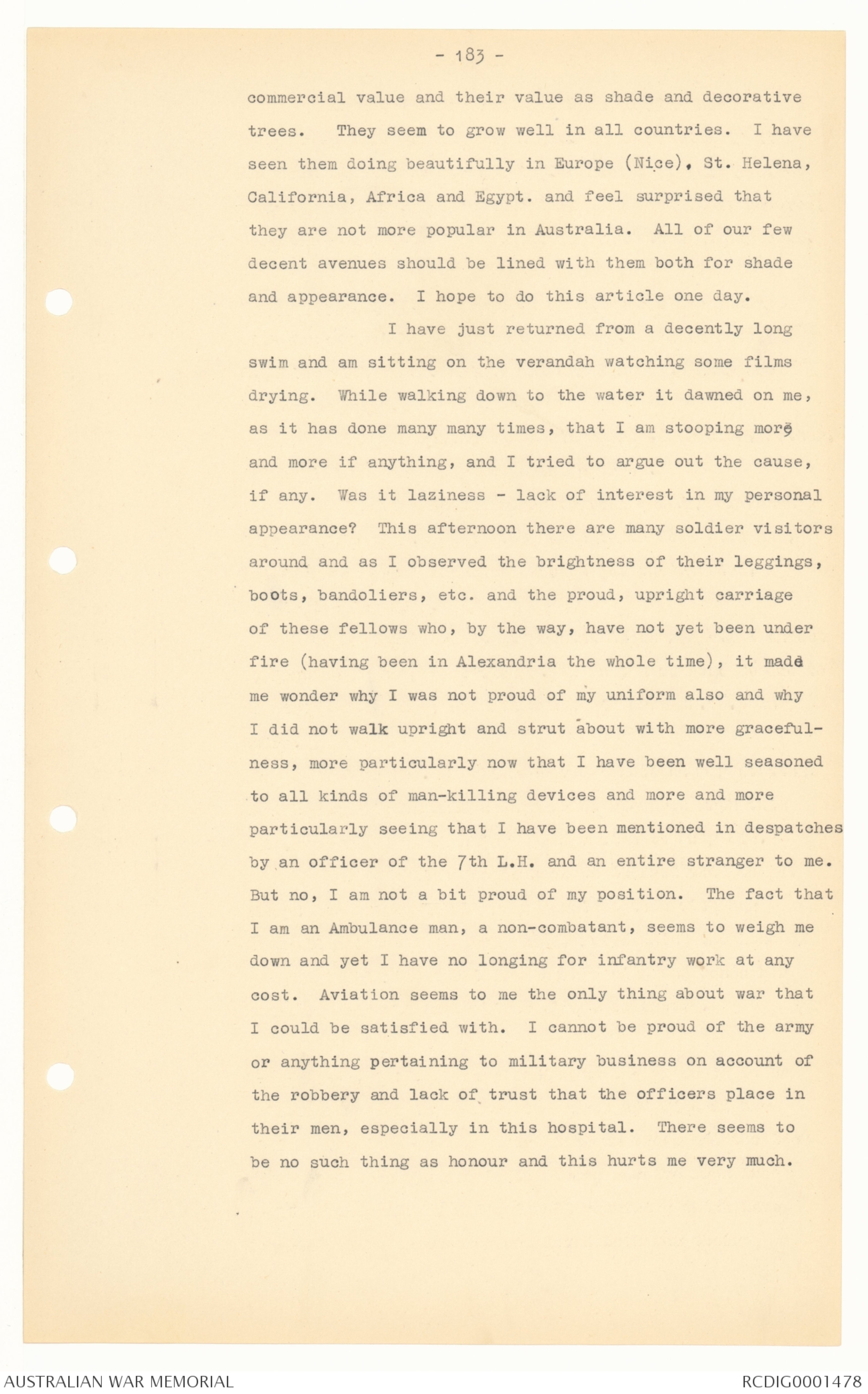
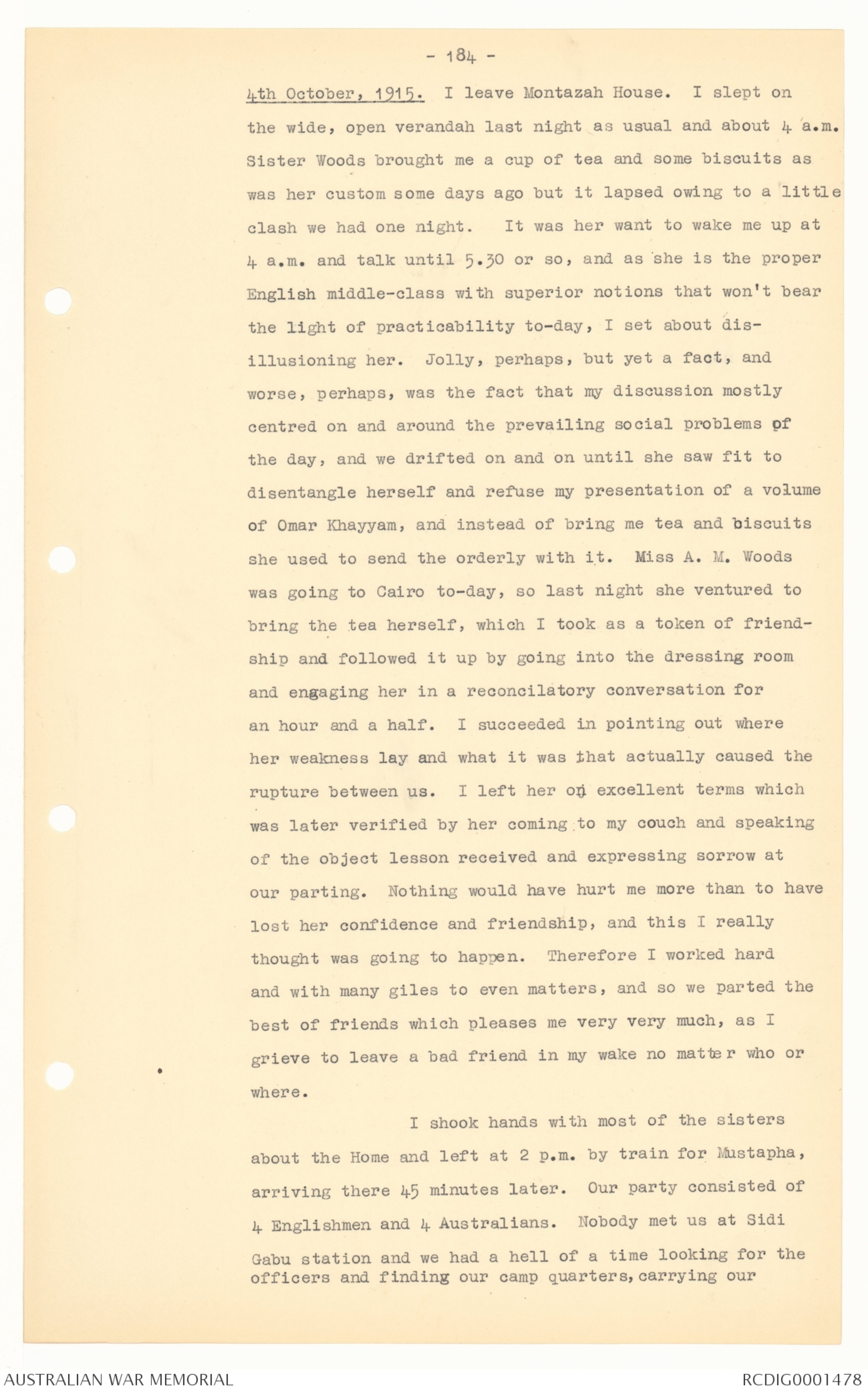
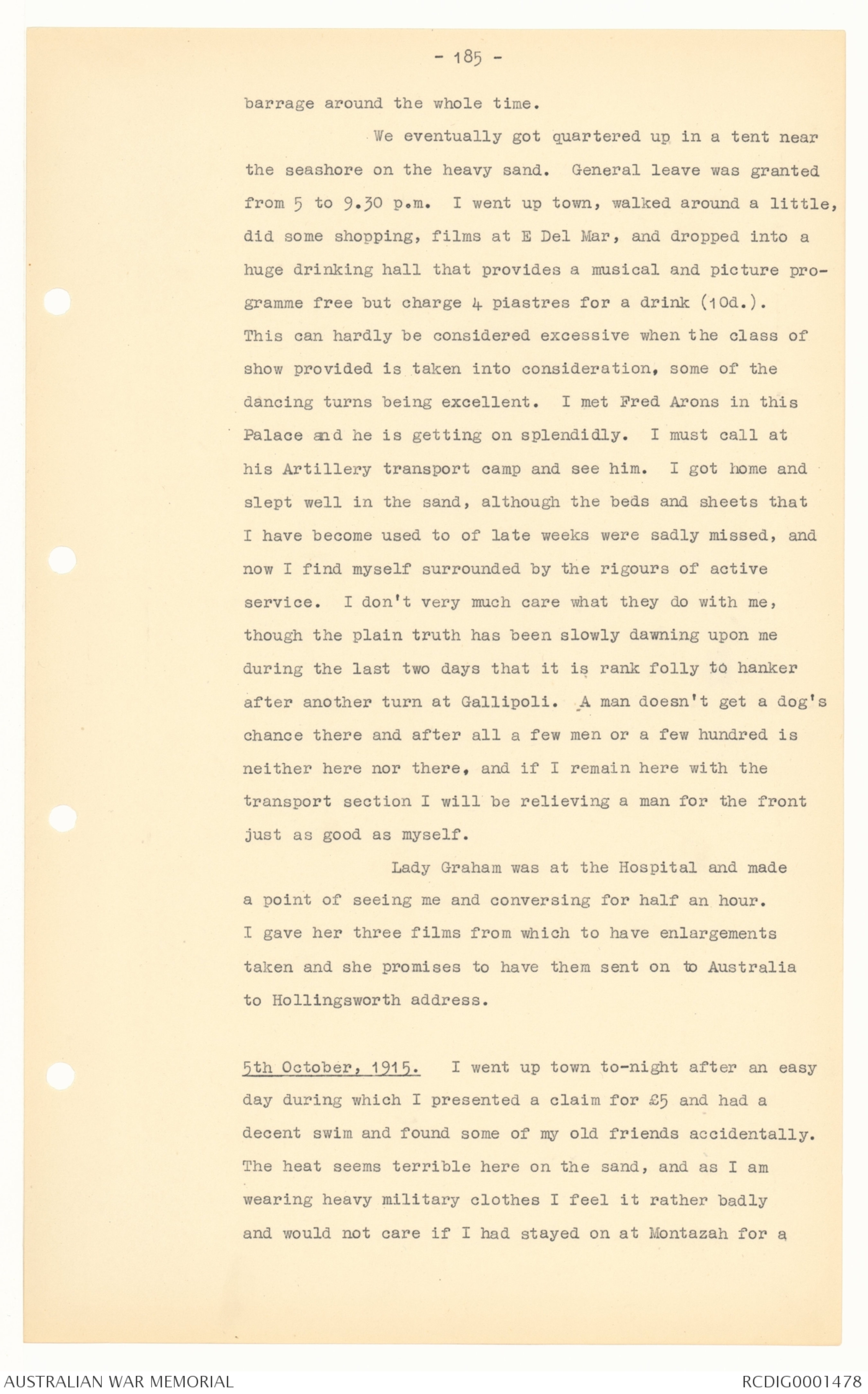
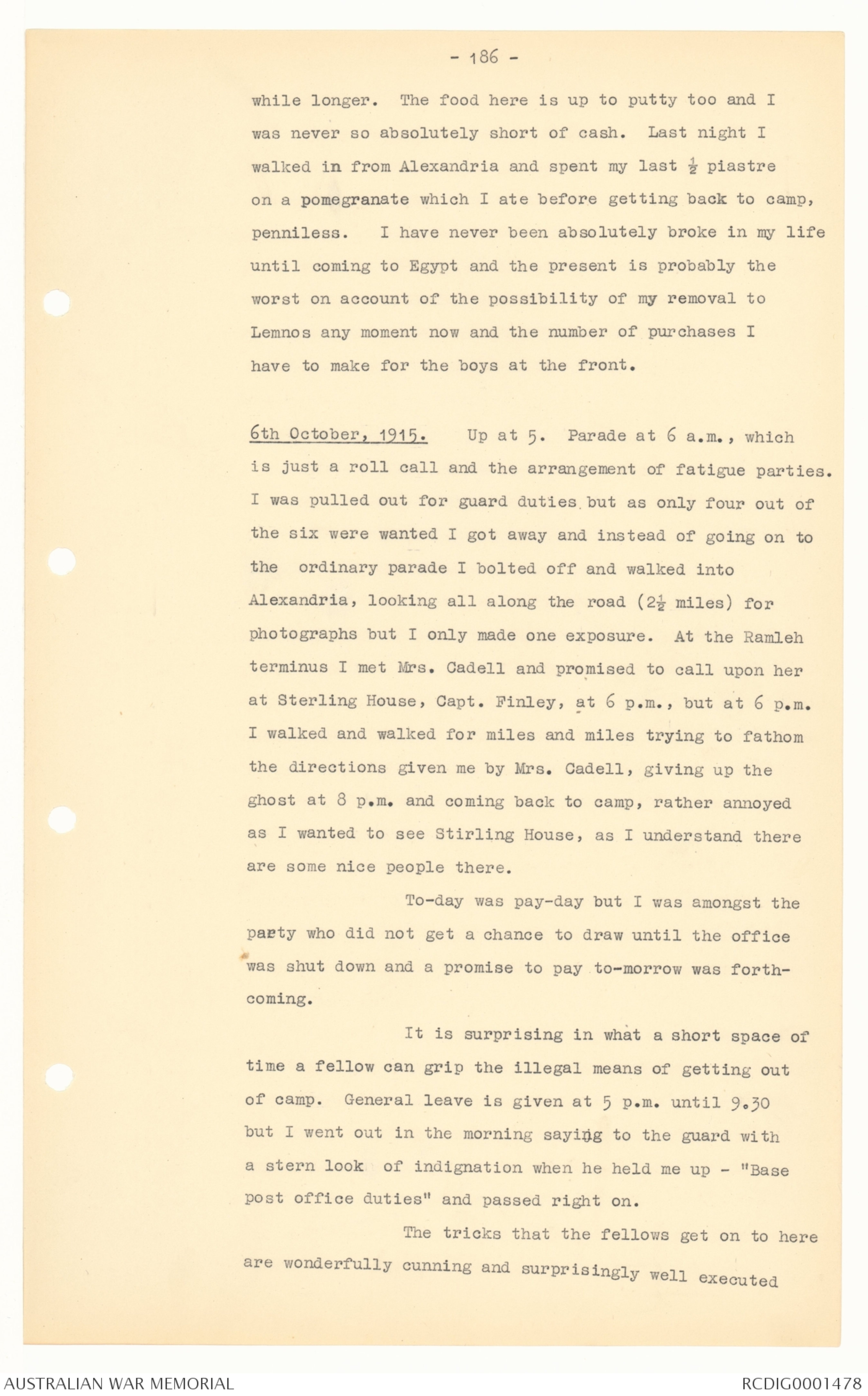
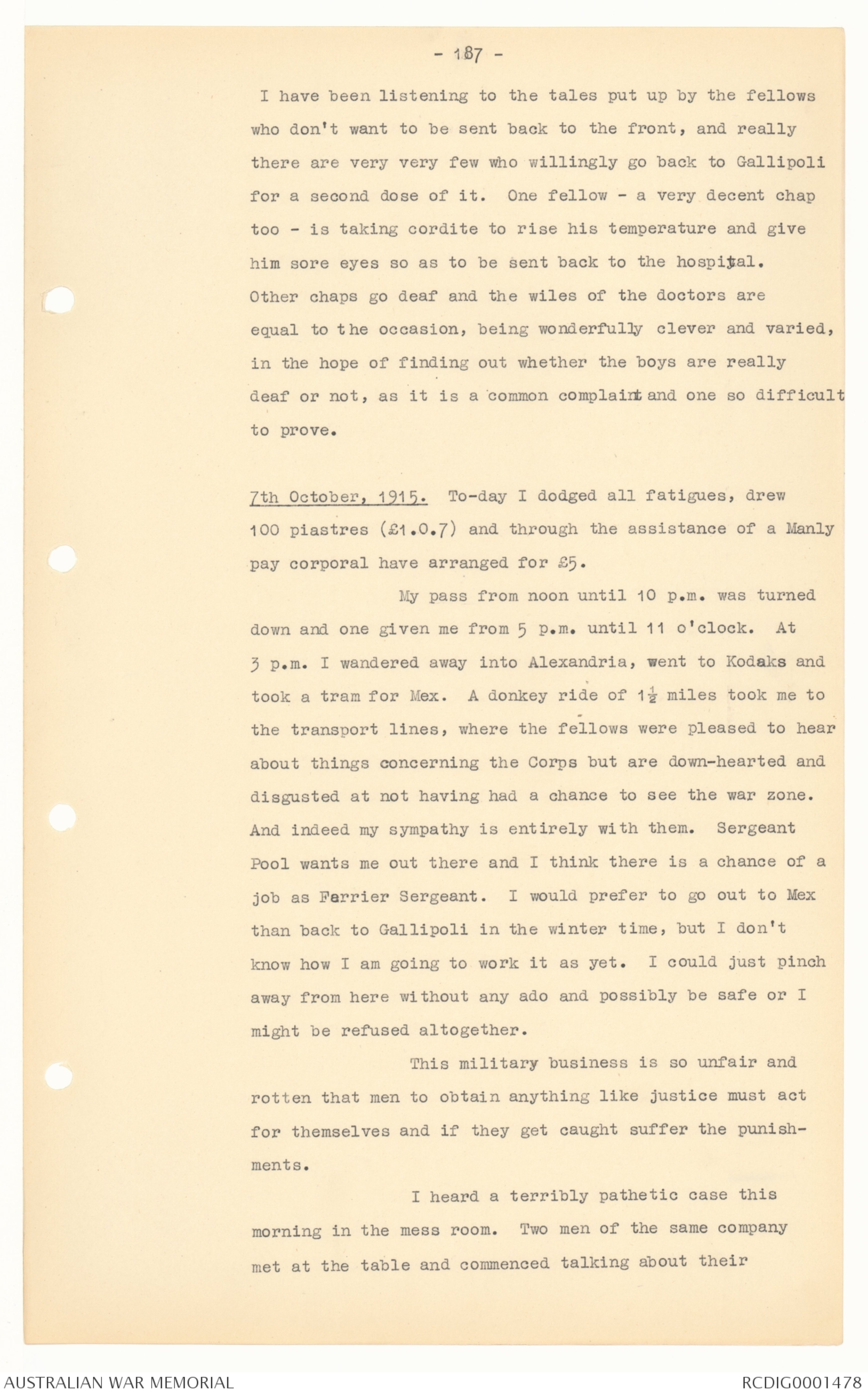
- 178 -
It seemed strange to me/that the "Catacombs"
were so dry at a depth of 95 ft., more so as there is a
canal which connects Alexandria to the Nile River, only
100 yards away.
These wonderful Catacombs were discovered by
accident as recently, I believe, as 1912, at which time
they were full up with water and debris.
I intended leaving the Catacombs in the cab
garry that waited for me but fearing it would be rather
late I discharged the cabman and to his astonishment I
gave him 10 piastres (2/1). Cabs are very cheap here.
I had this man for 1½ hours - a 6/- job in Australia.
It was now 5.30 and getting dull. I went on
to the sea front where there were a number of people of all
colours sitting and walking about. A nice breeze was
blowing, and as I leaned on the sea wall I thought, as I
gazed upon the ruins of the old lighthouse built by the
Romans and handed down to us, until it collapsed as one
of the world's seven wonders - Phasos Light, 590 feet
high. It was never considered a safe structure though
it remained for the earthquake in 13th century to destroy
it.
On strolling back into the main thoroughfare
I passed through the Gardens (which were remarkably
pretty and covered with grass when I saw them months
before). The Summer and the natives running wildly over
it has made it bare now. Groups of coloured families were
picturesquely resting leisurely and contentedly while the
children kicked a rag soccer ball about and the youth
gathered in bands and played good-naturedly at a game in
which one has to guess the man that touches or hits the
person standing up-right with right hand bent upwards
against the side of his face, and other other, palm
outwards, folded under the right arm.
- 179-
The players stand aside and behind and when
one man hits the palm either a light or a heavy blow
(and some of them fairly rattled the prisoner) the whole
of the players crowd in and holding a hand, finger
extended, up for the leading artist to pick out the
person who struck the blow. If successful, they
change places and so the game goes on continuously and
with considerable merriment.
I went down to get some dinner but after the
first course the place did not suit me so I went and did
some shopping deciding to dine later at the "Serene" at
7.30. This I did, after buying a volume of Omar Khyyam
for the Night Sister, Miss A. M. Wood, who at present is
very disgusted with me on account of my freeness and her
own pitiful simplicity but as I promised, so I will fulfil.
At 7.40 I got into "Serenes" and remained at
a table by myself - a one-man table - enjoying a fine
dinner with decent china and silver, white tablecloth
and a real serviette, midst the charm of a bowl of flowers
at my right elbow. The service was frightfully slow,
so much so that when I enquired the time from some
Frenchmen, after devouring some five courses with sweets
and fruit still to follow, learnt to my surprise and
horror that it was 9 o'clock, and the last train leaves
at 9.5 p.m. I paid up my 15 piastres (3/1d.) and after
some delay a cab was found to run me down to the tramshed
where the fellows often told me it was possible to overtake
the train at Victoria Station, some five miles out.
After a very pleasant ride through pretty San Stefano I
landed at Victoria College only to find the train had
gone through ten minutes earlier. My pass was for 10
o'clock and the authorities were pretty strict, but alas!
it was 7 minutes to ten and I had six miles to do either
on foot or on a donkey. They donkey man wanted 2/-. I
offered 1/-. We eventually settled up at 1/3 and on
- 180 -
the donkey with a big Arab planting whacks to the donkey's
rudder every few feet and shouting every time.
The night was very dark but this improved the glory of the
stars, so I was in my element even though the nigger
running behind (essential as he was) did irritate me.
We left the railway track and went into a dark and mystic
palm grove for half a mile, the Arab shouting and hitting
the donkey a severe blow causing the animal to canter.
The Arab had to run behind to keep up, as he could not
run on the sand more than 70 yards at a time. The journey
therefore meant a series of short sprints the whole way
through. This may not have been so bad but for the fact
that the saddle was a cumbersome affair that rolled about
somewhat and di not give me a chance to feel my knee grip
against the ribs. It was all saddle. This was all right
after a while and I did not notice it, but having no
stirrup irons and a rough carpet covering over the saddle
my bare knees and the inside of my legs right up got a
very rough time and rubbed through in several places before
we reached the back fence, where I gave the nigger 1½
piastres and bade him "good night." During the latter stage
of the continuous journey the moon gave a glorious
exhibition of its majestic powers, rising out of the palm
trees throwing their handsome shadows towards me, and at
the same time tingeing the dampened sand (the dew or
humidity is heavy at night times these hot days) with a
surface of changing sheen in colours from crimson to old
gold, presenting to me a brilliant spectacle and one that
I was quite prepared to suffer punishment for from the
orderly room on the morrow for coming in after "lights
out." That few miles trip was something to remember,
being as I was far from habitation with only a donkey
and an Arab for mortal company. The magnitude and
grandeur of the Heavens combined with the novel position
and the probable prediction on the following day, kept
- 181 -
my mind in a state of calmness and peacefulness.
After dispensing with the services of the
donkey and his counter-part I had some half mile of narrow
road, hemmed in with trees, to wind along and follow. The
shade was very thick and dark but yet the light beams that
did penetrate and find their way through did, with the
damp, musty smell, give me rather an interesting and
fantastic display. On reaching my balcony ward where there
are some 63 beds, I met the Night Sister who is very
particular about the fellows being in punctually, happened
to be in the darkened ward and so I ran face to face with
her, puttees rolled up and boots in hand, as they make
a terrible clatter on the tiled floor. She asked for an
explanation and got for a reply "The damned trains in this
country forget when and where to run at times."
I slept as usual on the isolated reading and
music balcony and woke up with the flies at daylight, but I
spent a great day and one that was novel and full of the
unexpected.
1st October, 1915. To-day has passed by without anything
serious or otherwise happening.
I took my clothes back to the pack store at
10 a.m. Took and made a mess of some photographs for Sister
Bermister. Received a letter from Mrs. Ferguson and some
small books from Maggie in Wales.
After dinner I wrapped up two parcels and
then tied them together for S. J. Graves of the 7th Light
Horse to take back to Sydney for me and leave with A.
Hollingsworth. These are three diaries and a lot of written
matter in one parcel and a shell time fuse with Turkish
bullets and some souvenirs in the other. Graves left at
2 p.m. with a party of 26 men "invalided home" to Australia.
As yet I have heard nothing about coming in
late last night.
- 182 -
A Scotch piper band has been playing here for an
hour or so this evening and night. Nobody actually likes
them and still more strange is the fact that nobody disapproves
of them. The sound 'midst this isolation, however,
does the men a lot of good. It is relaxation at any rate.
2nd October, 1915. I arranged my discharge for Monday
with four days' light duty at Mustapha. I have been
dabbling with photo. prints all day long with only more
or less success./
I have written to Hollingsworth, Ferguson, Mother,
Ralph Hill and probably to Bert to-morrow.
I have a little story to tell one day of woman's
idea of fair play. It is too delicate to deal with now,
but it's wonderful where some women get their weird,
unfair tactics from.
My total credit at present is only 4/-. I expect
to draw on Tuesday next though. I must have some £6 due to
me at 1/6 a day now, even though I did draw £2.16.3 in
Cairo.
Poor Mrs. Cadell received a note simply stating
that her services would no longer be required from this
date, and ended by thanking for devotion to duty etc.
The English people have engineered this to get
rid of her as she is always up against them with her
Australian ideas and strong head, yet I think the loss of
her son is playing terribly upon her mind and bends her
heart towards all Australians almost to excess.
3rd October, 1915. I am cleaning up to-day so as to be
able to get away in comfort to-morrow and find an unfinished
article on the Australian gum trees and the lack
of appreciation these splendid trees receive from Australians
themselves, while in all countries which have
imported these trees they are loved both for their
- 183 -
commercial value and their value as shade and decorative
trees. They seem to grow well in all countries. I have
seen them doing beautifully in Europe (Nice). St. Helena,
California, Africa and Egypt. and feel surprised that
they are not more popular in Australia. All of our few
decent avenues should be lined with them both for shade
and appearance. I hope to do this article one day.
I have just returned from a decently long
swim and am sitting on the verandah watching some films
drying. While walking down to the water it dawned on me,
as it has done many many times, that I am stooping more
and more if anything, and I tried to argue out the cause,
if any. Was it laziness - lack of interest in my personal
appearance? This afternoon there are many soldier visitors
around and as I observed the brightness of their leggings,
boots, bandoliers, etc. and the proud, upright carriage
of these fellows who, by the way, have not yet been under
fire (having been in Alexandria the whole time), it made
me wonder why I was not proud of my uniform also and why
I did not walk upright and strut about with more gracefulness,
more particularly now that I have been well seasoned
to all kinds of man-killing devices and more and more
particularly seeing that I have been mentioned in despatches
by an officer of the 7th L.H. and an entire stranger to me.
But no, I am not a bit proud of my position. The fact that
I am an Ambulance man, a non-combatant, seems to weigh me
down and yet I have no longing for infantry work at any
cost. Aviation seems to me the only thing about war that
I could be satisfied with. I cannot be proud of the army
or anything pertaining to military business on account of
the robbery and lack of trust that the officers place in
their men, especially in this hospital. There seems to
be no such thing as honour and this hurts me very much.
- 184 -
4th October, 1915. I leave Montazah House. I slept on
the wide, open verandah last night as usual and about 4 a.m.
Sister Woods brought me a cup of tea and some biscuits as
was her custom some days ago but it lapsed owing to a little
clash we had one night. It was her want to wake me up at
4 a.m. and talk until 5.30 or so, and as she is the proper
English middle-class with superior notions that won’t bear
the light of practicability to-day, I set about disillusioning
her. Jolly, perhaps, but yet a fact, and
worse, perhaps, was the fact that my discussion mostly
centred on and around the prevailing social problems of
the day, and we drifted on and on until she saw fit to
disentangle herself and refuse my presentation of a volume
of Omar Khayyam, and instead of bring me tea and biscuits
she used to send the orderly with it. Miss A. M. Woods
was going to Cairo to-day, so last night she ventured to
bring the tea herself, which I took as a token of friendship
and followed it up by going into the dressing room
and engaging her in a reconcilatory conversation for
an hour and a half. I succeeded in pointing out where
her weakness lay and what it was that actually caused the
rupture between us. I left her on excellent terms which
was later verified by her coming to my couch and speaking
of the object lesson received and expressing sorrow at
our parting. Nothing would have hurt me more than to have
lost her confidence and friendship, and this I really
thought was going to happen. Therefore I worked hard
and with many giles to even matters, and so we parted the
best of friends which pleases me very very much, as I
grieve to leave a bad friend in my wake no matter who or
where.
I shook hands with most of the sisters
about the Home and left at 2 p.m. by train for Mustapha,
arriving there 45 minutes later. Our party consisted of
4 Englishmen and 4 Australians. Nobody met us at Sidi
Gabu station and we had a hell of a time looking for the
officers and finding our camp quarters, carrying our
- 185 -
barrage around the whole time.
We eventually got quartered up in a tent near
the seashore on the heavy sand. General leave was granted
from 5 to 9.30 p.m. I went up town, walked around a little,
did some shopping, films at E Del Mar, and dropped into a
huge drinking hall that provides a musical and picture programme
free but charge 4 piastres for a drink (10d.).
This can hardly be considered excessive when the class of
show provided is taken into consideration, some of the
dancing turns being excellent. I met Fred Arons in this
Palace and he is getting on splendidly. I must call at
his Artillery transport camp and see him. I got home and
slept well in the sand, although the beds and sheets that
I have become used to of late weeks were sadly missed, and
now I find myself surrounded by the rigours of active
service. I don’t very much care what they do with me,
though the plain truth has been slowly dawning upon me
during the last two days that it is rank folly to hanker
after another turn at Gallipoli. A man doesn't get a dog's
chance there and after all a few men or a few hundred is
neither here nor there, and if I remain here with the
transport section I will be relieving a man for the front
just as good as myself.
Lady Graham was at the Hospital and made
a point of seeing me and conversing for half an hour.
I gave her three films from which to have enlargements
taken and she promises to have them sent on to Australia
to Hollingsworth address.
5th October, 1915. I went up town to-night after an easy
day during which I presented a claim for £5 and had a
decent swim and found some of my old friends accidentally.
The heat seems terrible here on the sand, and as I am
wearing heavy military clothes I feel it rather badly
and would not care if I had stayed on at Montazah for a
- 186 -
while longer. The food here is up to putty too and I
was never so absolutely short of cash. Last night I
walked in from Alexandria and spent my last ½ piastre
on a pomegranate which I ate before getting back to camp,
penniless. I have never been absolutely broke in my life
until coming to Egypt and the present is probably the
worst on account of the possibility of my removal to
Lemnos any moment now and the number of purchases I
have to make for the boys at the front.
6th October, 1915. Up at 5. Parade at 6 a.m., which
is just a roll call and the arrangement of fatigue parties.
I was pulled out for guard duties but as only four out of
the six were wanted I got away and instead of going on to
the ordinary parade I bolted off and walked into
Alexandria, looking all along the road (2½ miles) for
photographs but I only made one exposure. At the Ramleh
terminus I met Mrs. Cadell and promised to call upon her
at Sterling House, Capt. Finley, at 6 p.m., but at 6 p.m.
I walked and walked for miles and miles trying to fathom
the directions given me by Mrs. Cadell, giving up the
ghost at 8 p.m. and coming back to camp, rather annoyed
as I wanted to see Stirling House, as I understand there
are some nice people there.
To-day was pay-day but I was amongst the
party who did not get a chance to draw until the office
was shut down and a promise to pay to-morrow was forthcoming.
It is surprising in what a short space of
time a fellow can grip the illegal means of getting out
of camp. General leave is given at 5 p.m. until 9.30
but I went out in the morning saying to the guard with
a stern look of indignation when he held me up - "Base
post office duties" and passed right on.
The tricks that the fellows get on to here
are wonderfully cunning and surprisingly well executed
- 187 -
I have been listening to the tales put up by the fellows
who don't want to be sent back to the front, and really
there are very very few who willingly go back to Gallipoli
for a second dose of it. One fellow - a very decent chap
too - is taking cordite to rise his temperature and give
him sore eyes so as to be sent back to the hospital.
Other chaps go deaf and the wiles of the doctors are
equal to the occasion, being wonderfully clever and varied,
in the hope of finding out whether the boys are really
deaf or not, as it is a common complaint and one so difficult
to prove.
7th October, 1915. To-day I dodged all fatigues, drew
100 piastres (£1.0.7) and through the assistance of a Manly
pay corporal have arranged for £5.
My pass from noon until 10 p.m. was turned
down and one given me from 5 p.m. until 11 o'clock. At
3 p.m. I wandered away into Alexandria, went to Kodaks and
took a tram for Mex. A donkey ride of 1½ miles took me to
the transport lines, where the fellows were pleased to hear
about things concerning the Corps but are down-hearted and
disgusted at not having had a chance to see the war zone.
And indeed my sympathy is entirely with them. Sergeant
Pool wants me out there and I think there is a chance of a
job as Farrier Sergeant. I would prefer to go out to Mex
than back to Gallipoli in the winter time, but I don’t
know how I am going to work it as yet. I could just pinch
away from here without any ado and possibly be safe or I
might be refused altogether.
This military business is so unfair and
rotten that men to obtain anything like justice must act
for themselves and if they get caught suffer the punishments.
I heard a terribly pathetic case this
morning in the mess room. Two men of the same company
met at the table and commenced talking about their
 Not Yet Replaced By AI
Not Yet Replaced By AIThis transcription item is now locked to you for editing. To release the lock either Save your changes or Cancel.
This lock will be automatically released after 60 minutes of inactivity.